Related Research Articles
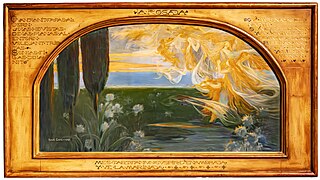
Adrià Gual i Queralt was a Catalan playwright and theatre businessman, founder of the Escola Catalana d'Art Dramàtic and a pioneer of cinema in Barcelona.
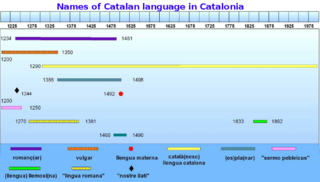
The first names, or glossonyms, of the Catalan/Valencian language formed in a dialectal relation with Latin, in which Catalan existed as a variety. These names already expressed the relationship between the two languages. New names that related Catalan to Rome came about to dignify the Catalan language in the thirteenth century, though Latinists called it vulgar and the people planus, or pla.
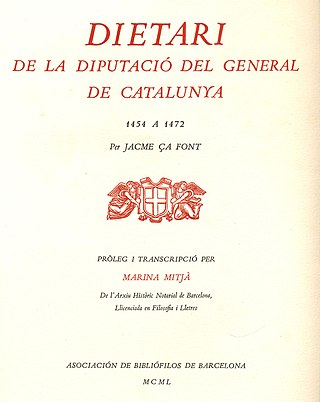
Jaume Safont (1420–1487), called Jacme ça Font in contemporary records, was a Catalan poet and notary.
The first complete Catalan Bible translation was produced by the Catholic Church, between 1287 and 1290. It was entrusted to Jaume de Montjuich by Alfonso II of Aragon. Remains of this version can be found in Paris.

Jordi de Manuel i Barrabín teaches Natural Sciences and is also a writer who combines literature with teaching and research. He is a member of the SCCFF.

Albert Ràfols-Casamada was a Spanish painter, poet and art teacher involved in the vanguard movements of his time. He is considered one of the most important, multifaceted Catalan artists of his time. His artwork began in the post-expressionist, figurative sphere but soon developed into his own abstract style grounded in a poetic rendering of everyday reality.
The Prudenci Bertrana Prize is a literary award for novels written in Catalan. It has been awarded annually since 1968 in honour of the Catalan author Prudenci Bertrana (1867–1941). The winner receives €42,000, and the prize is considered one of the most prestigious awards in Catalan literature.

The Catalan language originated from Vulgar Latin in the Pyrenees Mountains between France and Spain. It diverged from the other Romance languages in the 9th century. At that time, Catalan spread quickly throughout the Iberian peninsula when the Catalan counts conquered Muslim territory. By the 11th century, the Catalan language was present in several feudal documents. Catalan was present throughout the Mediterranean by the 15th century. At that time, the city of Valencia was thriving.

Oriol Bohigas i Guardiola was a Spanish architect and urban planner, known for his work in the modernization of Barcelona.
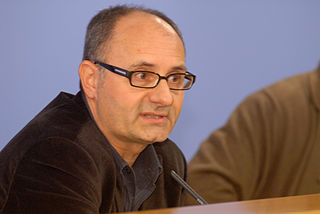
Joaquim Albareda Salvadó, is the chairing professor of modern history at Pompeu Fabra University (Barcelona) and former director of the Institut Universitari d'Història Jaume Vicens Vives at the same college. He is the head researcher of the research project España y los tratados de Utrecht (1712-1714), of the Spanish Ministry of Science and Innovation and Grup d’estudi de les institucions i de la societat a la Catalunya moderna . Director of the history collection publication Referències from Eumo Editorial. During last years he has focused his research on the topic of the War of Spanish Succession (1705-1714) and the political history of the 18th century.

Josep Maria Nadal i Farreras is Professor of History of Language at the University of Girona.

Josep Llunas i Pujals was a Catalan libertarian and free-thinker from Spain.
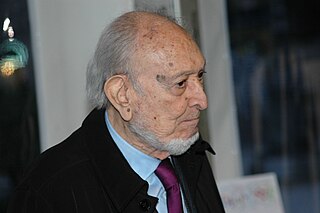
Josep Maria Castellet Díaz de Cossío, also known as José María Castellet, was a Spanish Catalan writer, poet, literacy critic, publisher and editor.

Maria Aurelia Capmany i Farnés was a Catalan novelist, playwright and essayist. She was also a prominent feminist cultural and anti-Franco activist.

Josep Coll i Martí, better known as Pep Coll, is a Spanish writer. A prolific author, he has cultivated all literary genres, including journalism. His life and literary world are the Pyrenees, which have become a legendary universe. His works have been translated into several languages, including Spanish and Basque. In addition to his work as a writer, he has been teacher of language and literature.

Joan Francesc Mira i Casterà is a Spanish writer, anthropologist and sociologist. He is an honorary member of the Associació d'Escriptors en Llengua Catalana and President of Acció Cultural del País Valencià. In politics he is a supporter and has been a candidate of Valencian Nationalist Bloc in 2000 and 2003.

Valentí Serra i Fornell, is a Spanish Capuchin and priest, whose religious name is Valentí Serra de Manresa.

Milícia Catalana was a Spanish nationalist and Catholic armed group that operated between 1986 and the mid 90s in Catalonia, Spain. Founded on 24 August 1985, the group was formed by Catholic priests affiliated with the Parroquia de San Félix Africano, who espoused the integralist teachings of Marcel Lefebvre, alongside notable figures from the Hermandad Sacerdotal Española. The emergence of this group is due to the parallel emergence in Spain of other violent right-wing groups that attacked the democratic opposition and the growing independentist and/or socialist movements. The political wing of Milícia Catalana was the Catalan Patriotic Movement (MPC).

Jordi Borràs i Abelló is a Catalan illustrator and photojournalist with an expertise in the far-right and neonazi movements from all over Europe.
Calaix de sastre is a personal diary in 52 volumes written by Rafael de Amat y de Cortada, Baron of Maldá, throughout his life, from the age of 23 until his death, that is, from 1769 to 1819. The title, Calaix de sastre, is the title given by the author himself, referring to the place where the most diverse things are kept. It is considered one of the most important texts of Catalan narrative between the 15th and 19th centuries, as well as a precedent of costumbrismo and local journalism. It is also an important historical document for its detailed description of facts, events and social behavior in the Catalonia of its time. However, it has never been published in its entirety, but only some compilations of fragments. A copy is preserved in the Historical Archive of the City of Barcelona.
References
- ↑ Amalia Zameño (2006). "Los manuscritos árabes de la Biblioteca de la Abadía de Montserrat". In Fundación El legado andalusí (ed.). Los manuscritos árabes en España y Marruecos. Fundación El legado andalusì. p. 120. ISBN 9788496395169.
- ↑ Maigí, Raül. El llegat del biblista arqueòleg , El Punt, 14 de enero de 2008
- ↑ Massot i Muntaner, Josep. Els creadors del Montserrat modern: cent anys de servei a la cultura catalana , L'Abadia de Montserrat, 1979, Vol.3 Biblioteca Serra d'Or, p.95-96, ISBN 84-7202-337-0, 9788472023376
- ↑ Gironell, Martí (December 2010). Las aventuras de un monje. Barcelona: Sapiens. pp. 4–49. ISSN 1695-2014.
- ↑ Riera i Milà, José M.[ dead link ], Fundació Catalunya-Amèrica Sant Jeroni de la Murtra (acceso 16-11-09)
- ↑ Tudela i Penya, Montserrat. La papirologia: una ciència de futur de la mà del passat , Revista del Col·legi Oficial de Doctors i Llicenciats en Filosofia i Lletres i en Ciències de Catalunya, núm. 129, Enero de 2008
- ↑ Janeras, Sebastià. Els cristians de l'Iraq [ dead link ], Hoja Diocesana Solsona-Vic, 9 de abril de 2006, p.4
- ↑ Edición facsímil del libro «El Sinaí» de Bonaventura Ubach
- ↑ La Bíblia. Versió dels textos originals i notes pels monjos de Montserrat Archived 2010-09-30 at the Wayback Machine , Casal i Vall, 1990 (Primera edición:1970), ISBN 99913-1-005-3
- ↑ Reseña del libro Dietari d'un viatge per les regions de l'Iraq (1922-1923)